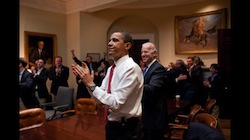How Health Care Will Help Obama's Security Agenda
March 22, 2010
Featured Image
We are happy to serve you a daily summary of the day's top nuclear policy stories each morning, with excerpts from the stories in bullet form.
Stories we're following today:
How Will Health Care Vote Affect National Security? - Heather Hurlburt in Democracy Arsenal [link]
- More than you think, actually.
- Israeli, Russian and Chinese leaders and elites have all let it be known more or less quietly that they treat Obama as if he is weak abroad because they perceive him as weak at home.
- Those elites follow American politics closely and will understand that this is a big, big win. They'll also get the message that Obama doesn't go away easily.
- Internationally, it looks as if this long drawn out process will close just before we finally get a new START Treaty, a mark of both serious steps down the road to reducing the nuclear threat and a success in renovating the US-Russian relationship.
- Just the progress to this point threw Obama's approval rating back over 50%. Progressives both in and outside government have been needing a little boost of energy.
U.S., Russia Will Sign Nuclear Treaty in April: Report - Agence France Presse [link]
- Russia and the United States will sign a new nuclear disarmament treaty in early April in the Czech capital Prague.
- "The new nuclear disarmament treaty is ready," said the source, who talk part in Friday's talks between Russian Foreign Minister Sergei Lavrov and US Secretary of State Hillary Clinton on the matter.
- Russian media reports have already said country's two leaders would like to sign the final agreement in an Eastern European capital before the United States hosts a nuclear security summit from April 12-13.
There's Nothing New on Iran - Bulletin of the Atomic Scientists [link]
- The International Atomic Energy Agency's (IAEA) February report PDF on Iran, the first under the agency's new director-general, Yukiya Amano, has created quite a stir.
- Yet the media has seriously misrepresented the actual contents of the report. In fact, no new information has been revealed.
- Such incorrect analysis shouldn't be taken lightly, however; it weighs in the balance between war and peace in the Middle East.
- An already dangerous standoff is being made worse by the distortion of this recent IAEA report.
- It's important that a decision to abandon negotiations and move to crippling sanctions or military attacks be based on solid facts of wrongdoing.
What's the Point of Nuclear Weapons on Instant Alert? - ABC News [link]
- Why does the US keep its nuclear weapons "on alert", and are they really needed?
- To deter or respond to an attack, nations don't need to keep weapons on alert, says Oelrich. No country could take out all US missiles in a first strike, so a reprisal would not need to be speedy.
- Missiles on alert are worrying, partly because a malfunction could lead to accidental launch, or they could be hijacked - but mostly because they could be launched by misinformed or pressurised military leaders or politicians during a fast-evolving situation.
- One way to make verification easier would be to keep warheads and missiles in separate buildings, as China already does.
Reduce Nuclear Arms, Set an Example - Sandra Butcher in The Guardian [link]
- Brown, Obama and current and former political leaders worldwide have admitted the world has reached a new and more dangerous nuclear reality.
- Timid steps now from the US and the UK will lead toward a ripple effect throughout the world, where other nuclear states and would-be nuclear weapons states would follow the US and UK examples.
- It is impossible for the US and Britain to maintain continued reliance on nuclear weapons as the "fix" for their security and not bear responsibility for a future in which an increased number of states adopt the same logic.
- It is time for the US and the UK – partners in the so-called special relationship – to decrease the number of and their reliance on these inhumane and unusable weapons.
What Happens if Iran Gets the Bomb? - Doyle McManus in The Los Angeles Times [link]
- The Obama administration's goal is still to prevent Iran from acquiring nuclear weapons. But like many of the president's worthy aspirations, this one may be unattainable.
- As Israel's defense minister, Ehud Barak, put it last month: "I don't think that the Iranians, even if they got the bomb, are going to drop it immediately on some neighbor. They fully understand what might follow."
- A growing chorus that includes former Secretary of State James A. Baker III and former National Security Advisor Zbigniew Brzezinski, are warning against a military strike on Iran by either the United States or Israel.
- A military strike, they say, would create chaos and strengthen its hard-line regime.



